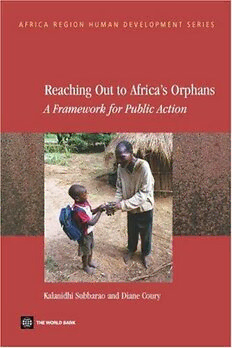
Reaching out to Africa's orphans: a framework for public action PDF
184 Pages·2004·1.197 MB·English
Most books are stored in the elastic cloud where traffic is expensive. For this reason, we have a limit on daily download.
Preview Reaching out to Africa's orphans: a framework for public action
Description:
HIV/AIDS is generating a major humanitarian crisis for families in Sub-Saharan Africa. The number of children who have lost one or both parents to AIDS is expected to rise to 35 million by 2010. Rolling back decades of progress in social development, HIV/AIDS has become a major constraint in the fight against poverty. Many African countries are also suffering from civil unrest and post-conflict situations resulting in more orphans or displaced children. 'Reaching Out to Africa's Orphans' makes a substantial contribution to our understanding of the many risks and vulnerabilities faced by orphans and the ameliorating role played by the actions of governments and donors. It brings together the admittedly limited evidence from interventions on behalf of orphans with a view to advancing our knowledge on what works and what does not in mitigating the risks faced by orphans, and enhancing capacities of communities to address this problem. Juxtaposing the risks and needs of orphans against the effectiveness (including cost-effectiveness) of care-giving arrangements, the study addresses issues bearing on how to scale up the more promising interventions. The authors draw several important conclusions on the strengths and weaknesses of various programs, targeting methods and their implications and, in particular, highlight the gaps in our knowledge with respect to the cost-effectiveness of interventions and the potential incentive effects of orphan care. Considering that resources are limited and the problem is immense, the study rightly underscores the need for coordination of efforts among all agencies seeking to respond to the crisis.
See more
The list of books you might like
Most books are stored in the elastic cloud where traffic is expensive. For this reason, we have a limit on daily download.
